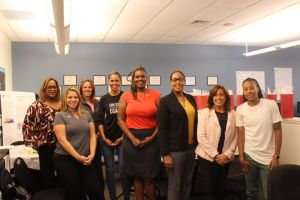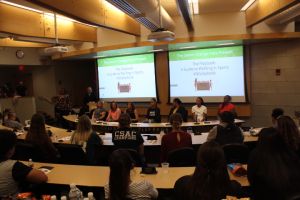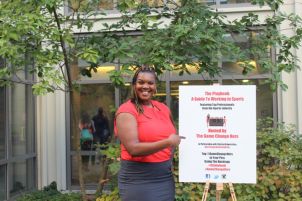Mickey Grace, the first female coach of the Philadelphia women’s pro tackle team, was one of the speakers at the Game Change Hers panel on Oct. 24 at Cabrini University. The Game Change Hers panel was held to address, educate and inspire women who want to go into the sports industry.
“You can do anything, but you cannot do everything,” Grace said.
Grace and the other seven panelists at the Game Change Hers event were motivational and inspiring. They talked about what they went through and how they got to where they are now in their careers. They made their stories relatable for the students and that helped the crowd connect with them.

The other speakers were Tangi James-Boone, Paulette Branson, Lynnette Camacho, Bria Young, Angela Christino and Kate Corcoran.
Game Change Hers is an organization that was founded in 2014 by two motivated young women who saw that the females they were mentoring were not aware of the multitude of careers available in the sports industry for them.
The vision for Game Change Hers is to let other females who are considering a career in the sports industry know that there are spots for them.
The panel was full of motivational women who have made it in the sports industry and who want to help other females find their places in the industry.
“What you decide to major in is most likely not what you are going to do in life,” Branson said.
During the event, the panelists were being extremely honest and open with the crowd. Their experiences made what they had to say even more impactful.
“All the panelists were females who made it in the sports industry, which made me feel confident to keep fighting for my dreams and passions,” Yorkenia Gómez said.
Many students found it inspiring to see all the women talking about how they made it in a field that consists of mostly men. They were extremely motivating during the event and helped many students.
“During this time of the semester when everything is getting stressful, I felt the event helped me maintain a more positive attitude towards my college education,” Gómez said.

John Volz, a sophomore business major, said, “I have never heard of anything that is for empowering women in the sports industry before.”
This event brought light to the subject that there are places for women in the sports industry.
“It was definitely worth going to the event. The panelists were excellent speakers and it changed my view on women in the sports industry,” Volz said.
“We work twice as hard for half as much,” Grace said.
Women in the sports industry have to work significantly hard for half as much money than men make.
Live Strong reported that, “According to the Women’s Sports Foundation, male athletes get $179 million more in athletic scholarships each year than females do.”

“I hope this panel has affected others here. I think that something we said tonight left them with a thought or something to think about on where they will further their career and where they pick their career,” Boykins said.
Ashlee Dushkewich, a sophomore human resources management major, said, “I thought the event was very empowering. For someone not really looking into the sports industry, I found each of the women on the panel courageous, inspiring and motivational.”
The panel did more than just tell others about the jobs there are for women in the sports industry; it inspired and motivated others who might not even want to go into that industry. The message seemed to be: work hard for what you love to do.
“It is okay to fail because at the end of failure comes success,” Boykins said.


